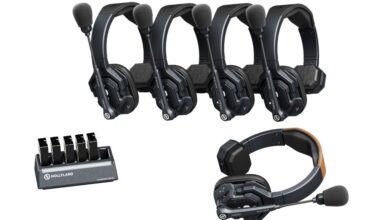Vertere Acoustics announces new DG-1 S – updates to the multi-award-winning record player
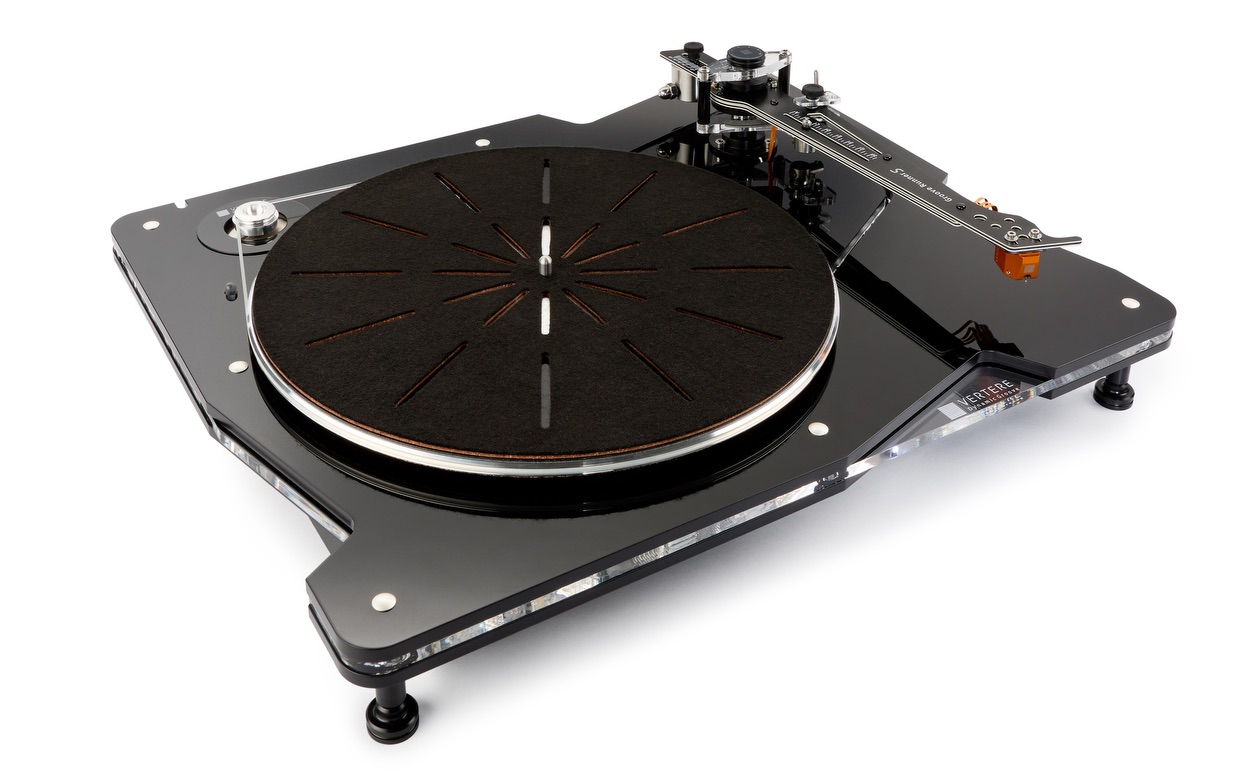
Touraj Moghaddam, founder and chief executive of Vertere, today announced that the multi-award-winning DG-1 record player is being updated and improved.
It has been three years and three months since the launch of the hugely innovative and hugely popular DG-1. These three years have been like a lifetime in standard years with a pandemic, supply chain complications and shortages, and multi-national inflation. But one benefit – it gave Touraj time to think; as anyone who knows Touraj well realises, the time to think always means product improvements. Interesting times bring exciting products. “Improving music reproduction by a million tiny steps – some not so tiny.” The DG-1 S will be available in September 2022.
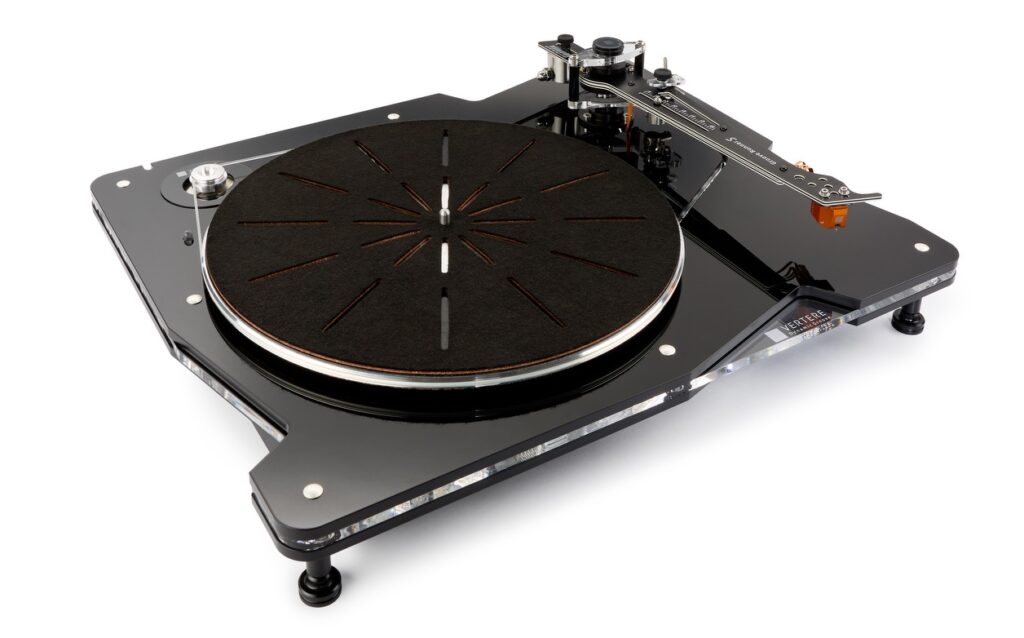
The DG-1 S improvements bring higher resolution replay, greater dynamic contrasts, and improved stereo separation with greater precision while simultaneously keeping the musicality the DG-1 delivers with great aplomb.
Summary of the DG-1 S Improvements
Improved platter bearing – The precision machining and polishing operations have a higher tolerance with the variation halved statistically. The super smooth finish bore with the precision Tungsten Carbide interference fit ball delivers lower noise, lower rumble, a lower effort for the motor and less rotational variability.
Groove Runner S tonearm – The arm beam is now constructed from a five-layer polymer laminate bonded to a second five-layer polymer laminate. The PCB flex signal carrier is bonded in-between the two laminates. The profile of the arm and bearing has improved the counterweight/bearing/headshell/cartridge alignment.
Improved tonearm bearings – The Vertical Kevlar thread bearing is now adjustable for tension and azimuth. The Horizontal nylon thread bearing is now fitted with greater precision to ensure even greater consistency.
New Motor Drive software allows separate adjustment in two steps, initially the sine wave voltage and then the cosine wave adjustment at the final stage for the absolute lowest noise and vibration. Improved coupling between the three plinths – improves resistive damping and reduces noise
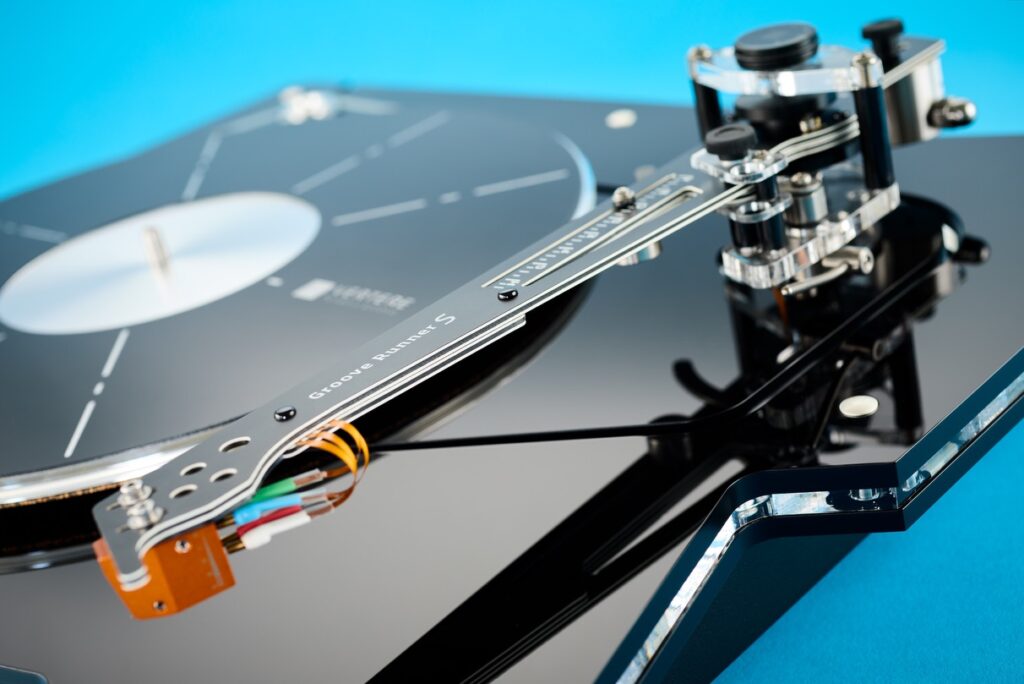
Background to the design
Vertere Acoustics is best known for its extreme high-end designs loved by audiophiles worldwide. The Reference RG-1 Turntable and the Reference Tonearm compete on equal terms with the world’s best.
The new DG-1 S Dynamic Groove Record Player targets a less extreme customer driven by performance who almost needs Plug and Play setup. From Vertere’s research, this customer wants ease of setup and use but not at the expense of future upgradeability.
To design a record player that will sell for £3550 (€4148, $4995 Aus$7000) including Magneto cartridge when the brand’s existing designs can sell for £200k requires a back-to-fundamentals approach. Taking his existing ideas, reducing material quality, and slackening tolerances would not be the Touraj way.
Back to fundamentals involved examining every design element, rethinking the way turntables work, and removing every superfluous element that got in the way of the ultimate aim: getting the listener as close as possible to their music.
Everything has been redesigned and re-engineered, from the plinth to the arm and its bearings, developing some of the basic principles of a record-playing system while completely rethinking others.
Touraj Moghaddam The result is an elegant turntable that looks like no other. It draws on the engineering of the reference models to deliver outstanding performance and ease of operation at a newly affordable price.
“The job of a record player is very simple and very linear,” says Touraj Moghaddam, “the most accurate measurement of something going past the stylus and throwing it from side to side over 1000 times every centimetre.”
| The new DG-1 S design in detail Advanced, improved, microprocessor-generated electronic motor drive for the best possible driveFully Programmable and Copper/Stainless Steel shielded Motor Drive PCB – allowing for future upgradesLow voltage 24 Pole Precision Synchronous Motor, with its dedicated motor drive supply precisely adjusted for lowest motor noise and vibrationImproved super-accuracy polished stainless steel, high aspect ratio, main bearing spindle and main bearing housing with Tungsten Carbide super-precision BallHigh precision CNC machined aluminium alloy drive pulleyHigh Precision Machined Aluminium Alloy Platter with bonded PETG Record Interface Mat and Cork/Neoprene/Nitrile bonded underside plus resonance control diskNoiseless and Stiction eliminating Thread Tonearm Bearings, each made up of hundreds of 3 microns thick twined Nylon 6.6/6 strands horizontal and two Kevlar threads verticalTwin Bonded five-layer Polymer sandwich non-resonant Tonearm BeamOne piece, Gold Plated Flexible PCB Tonearm Internal WiringStainless Steel Main Balancing Counterweight and Tracking Adjustment Weight with azimuth adjustmentThree new design adjustable feet with Resistive Felt PadsNon-resonant, triple sandwich Cast Acrylic Main and Sub Plinth structure with improved intercoupling and coupling to the steel main-chassis for rigidity and structural supportLow frequency compliant, Tuned Silicone rubber integrated isolation systemBespoke clear precision silicone rubber round ‘belt’ – stable with temperature and humidityProgrammable Standby light33/45 touch button speed selectorNon-resonant clear Polycarbonate dust cover with elegant Integrated hingesMulti-voltage, Multi-plug Mains Power Adaptor – suitable for almost any region or can be upgraded with the Challenger power supply | |
| The core elements in more detailThe MotorThe motor is the most crucial part of any turntable: it’s the only source of energy for the signal generated by the cartridge and fed out to the amplifier, so quality and accuracy are vital. The DG-1 motor system is derived from that developed for the flagship RG-1 Reference Motor Drive: it uses the most advanced motor drive, delivering the best possible performance. The motor itself is a low voltage 24-pole Precision Synchronous design, individually tuned for the lowest noise and with an offboard power supply. An addressable microprocessor PCB controls it during manufacture to ensure accuracy and programmability for future upgrades. A copper and stainless-steel cover provides shielding from both inward and outward interference.The Platter assemblyDrive to the platter is via a precision machined aluminium alloy pulley on the motor and a bespoke silicon rubber drive belt, with electronic speed change for ease of use. The platter is also a precision machined alloy, bonded to a PETG record interface mat, and, on the underside, a cork/Neoprene/nitrile disk bonded to control platter resonance.The BearingThe platter fits onto a super polished stainless-steel spindle that rides in the main bearing housing on a super precision tungsten carbide ball. The complete main bearing assembly is long-term lubricated for longevity and ease of use. This avoids regular repeated recharging of the bearing lubricant, which is essential to prevent premature wear and damage—another example of simplifying this turntable to optimise performance. In addition, the new super-precision bearing delivers lower noise, lower rumble and lower rotational variability.The Groove Runner S Arm The DG-1 S arm is uniquely Vertere and differs from conventional thinking in its use of a flat profile in place of the usual tube. Conventional arms use tubes for stiffness, but these can bring all kinds of problems with high Q resonances and thus the need for critical damping – costly and complicated. The DG-1’s bonded double five-layer, non-resonant tonearm beam avoids these problems. In addition, in place of conventional tonearm cabling, a flexible PCB is sandwiched into the arm to carry the signal from the cartridge to the output terminals. Completing the arm are a stainless-steel counterweight with azimuth adjustment and a fine adjustment tracking weight, giving a total solution that’s as simple and elegant as it is innovative. |

Thread bearings
Many solutions have been sought over the years for precise bearings, but for the DG-1, Vertere has developed a very simple solution: twisted nylon (hundreds of 3 microns thick twined Nylon 6.6/6 strands) and Kevlar threads– one for movement in the horizontal plane, and two Kevlar for the vertical axis. These threads have many advantages, not the least of which is simplicity: they exhibit none of the Stiction – or initial resistance to movement – of conventional bearings, are super-light and noiseless, and the twist of the thread controls and damps the movement of the arm.
The Plinth
Like the tonearm, the DG-1 plinth is a sandwich construction, using non-resonant cast acrylic to form the main plinth and the sub-plinth for a clean and sophisticated look. This three-layer design incorporates the control button, the speed indicator and the user-selectable standby mood-lighting, as well as the silicon rubber isolation between the plinth and the platter assembly. The whole assembly sits on a steel chassis, chosen for optimal stability, housing the motor drive circuit and the motor, all supported by three new-design adjustable feet with Resistive Felt Pads.
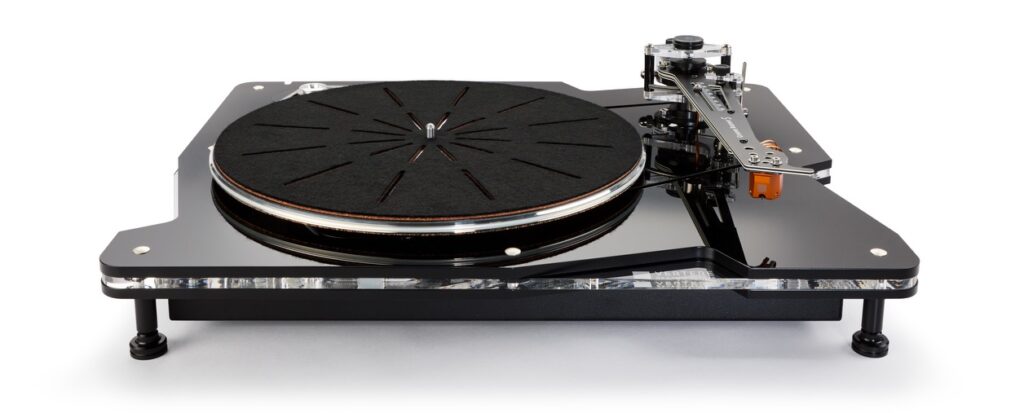
The DG-1 S comes with a non-resonant Polycarbonate dust cover, where its hinges are integrated into the plinth for a sleek and modern profile.Touraj explains the source of some of his background knowledge“Our collaboration with music industry engineers has given us invaluable insights into the art of cutting. This knowledge has enabled us to advance our record player design in many ways to extract the maximum from vinyl records.For example, with his recent remixes of the Beatles albums, Giles Martin – son of the late Sir George – used a Vertere MG-1 record player, including SG-1 tonearm and PHONO-1 preamplifier throughout, to check and approve the acetates and the test pressings.And we’ve worked closely with the multi-award-winning mastering engineer Miles Showell: since February 2017.Miles has been using his own extensively customised Neumann VMS 80 lathe, incorporating Vertere cables, to cut normal and half-speed masters for the likes of ABBA, Cream, The Police and The Rolling Stones, and also the 50th-anniversary release of The Beatles’ Sgt Pepper’s Lonely Hearts Club Band and The Beatles (otherwise known as ‘The White Album’).Working closely with Mileshas led to the first releases on our record label Vertere Records. Releases: a three-track EPand a first albumby Scottish band Caezar, and the first album by Dutch singer/songwriter Elles Springs, which was specially tape-transferred, and then half-speed mastered and cut by Miles for our label.By involving ourselves at every stage of the record-making process, we can ensure our players bring you as close as possible to what the artists and engineers wanted you to hear.” |
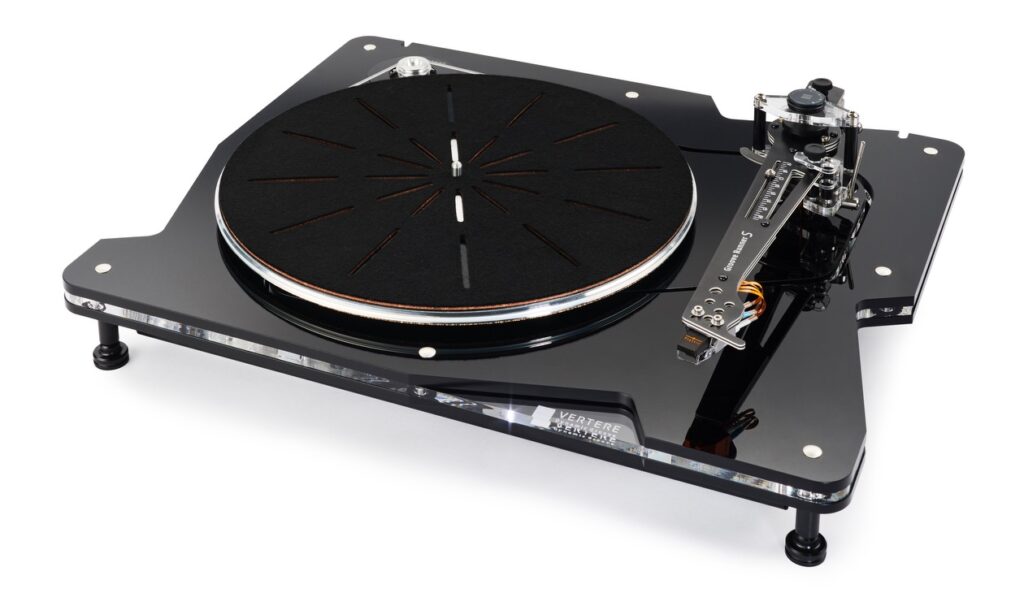
About Vertere
Reducing engineering to its fundamentals, to get you even closer to the original recording.
When aiming to reproduce the complexities of music, it’s all too easy to introduce even more significant complication in the engineering of audio equipment, putting in place one element to solve the problems until the whole design escalates into something fiendishly intricate – and expensive.
That’s not the Vertere way: coming at the whole problem with decades of audio and mechanical engineering experience, plus close collaboration with the recording and mastering industry, we step back, take a long hard look at the fundamentals, and look for simple, elegant solutions.
That may sound like a simple ‘less is more’ philosophy, but we prefer to look at it this way: the best audio equipment shouldn’t add anything to or remove anything from the original recording. Instead, it should affect it as little as possible; bringing the listener ever closer to what the artist, producer and mastering engineer wanted you to hear.





